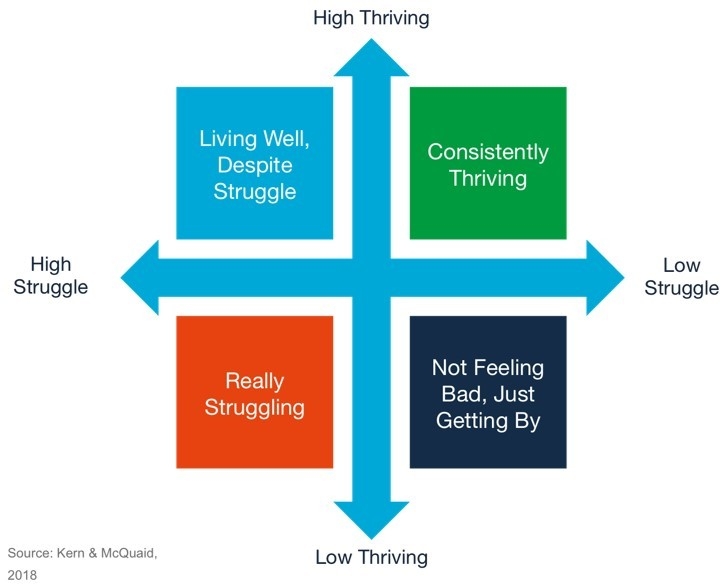Our Mission: The Employee Engagement & Wellbeing initiative is brought to you in partnership between NKU HR and Wellness. Our mission is to support the engagement and wellbeing of NKU faculty and staff so they can thrive in their roles and drive student success.
Who We Service: While we know wellbeing is important for the entire NKU community, the efforts of the Employee Engagement & Wellbeing initiative are focused on supporting the health and wellbeing of NKU faculty and staff. When faculty and staff are engaged and thriving, it positively impacts student success.

Wellbeing is the experience of good health and happiness. It includes having good physical and mental health, high life satisfaction, sense of purpose and ability to be resilient. You can think of it as a balance between the challenges you face and your ability and resources to overcome or thrive despite those challenges.
Positive Psychology researchers Dr. Peggy Kern and Michelle McQuaid have found that wellbeing is best described on two related but distinct continua: high or low levels of thriving (i.e. feeling good and functioning effectively) and high or low levels of struggle (i.e. physical, psychological, social, financial or any other struggle). See diagram on the right.
When it comes to improving or maintaining people’s wellbeing in workplaces, Kern and McQuaid suggest that our goal should not be to only have more people who are consistently thriving in our workplaces, but to respect and value the resilience that people who are living well despite struggles bring to our organizations.
A 2016 Gallup survey found that 52% of Higher Ed faculty were not engaged at work and another 14% were actively disengaged (Gallup 2017). Paired with recent research that shows 39% of colleges and universities don’t offer any employee engagement opportunities (Cornerstone & Ellucian 2016) - we have the potential for an engagement crisis in our higher ed institutions across the country.It is especially important for educators to be engaged because we know that when educators are engaged, students thrive. Specifically in higher ed, Gallup found that without university employees who “go above and beyond,” “students are less likely to be engaged in education and prepared for life.” (Gallup & Purdue University, 2014). The research report also found that if a student has a faculty member who cares about her/him as a person, they are 1.4x more likely to be thriving.Faculty and staff experiences matter and their ability to be engaged at work can make all the difference in outcomes for students.
Improved Individual Performance: Employees with high levels of wellbeing are likely to learn more effectively, be more creative, have better relationships, be more pro-social in their behavior, feel more satisfied in their jobs and perform better (Chida and Steptoe, 2008; Diener et al., 2010; Dolan et al., 2008; Lyubomirsky et al., 2005).
Up to 8 times more engaged: Employees are up to eight times more likely to be engaged in their role when wellbeing is a priority in their workplace (New Economic Foundation, 2014; World Economic Forum, 2010).
Up to 3 x more productive: Employees with high wellbeing are able to work longer and more effectively due to their improved goal attainment and levels of resilience (Medibank Private, 2005; World Economic Forum, 2010; PwC, 2014).
Healthier employees: Workplace health & wellbeing programs can achieve an average of 32% reduction in workers’ compensation and disability claim costs (Chapman, 2003) and up to 30% reduction in sick leave. Healthy workers take up to 9 x less the annual sick leave absences of unhealthy
workers.
Retained Talent: Employees who take an unfavorable view of their workplace’s commitment to health & wellbeing are four times more likely to leave in the next 12
months. In contrast, 64% of those who take a favorable view indicate they are
likely to stay for the next five years (World Economic Forum, 2010).